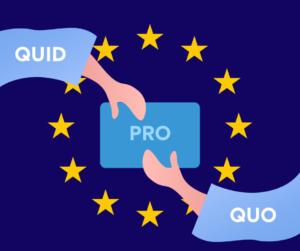Headquarters: Svetog Nauma 7, 11000
Office address: Đorđa Vajferta 13, 11000
Phone:: +381 11 4529 323

For the EU, New Year’s Eve marked the end of Brexit, but also the conclusion in principle of the negotiations on the EU-China Comprehensive Agreement on Investments (CAI). Although the deal was overshadowed by the UK’s departure from the Union, the CAI was nevertheless praised by the European Commission President Ursula von der Leyen who argued that it will provide “unprecedented access” to the Chinese market for European investors. A member state expected to strongly benefit from this agreement is Germany, not only as China is its largest trading partner, but also due to its importance to German carmakers and other manufacturers with large operations in China. In that regard, it is unsurprising that the German Chancellor Angela Merkel played a crucial role during the German Presidency of the Council of the EU in reaching the deal after seven years of negotiations.
Yet, members of the European Parliament (EP) were not as enthusiastic about it, particularly Guy Verhofstadt, from Renew Europe, who even warned that the EP will never ratify the CAI “without commitments and proof that the human rights of Hong Kongers, Uyghurs & Tibetans improve.” Considering that the CAI cannot pass without the EP’s ratification, the CAI will therefore continue to be a matter of debate in the following year. In order to understand what the controversy is all about, the following will provide a brief outlook of the CAI and answer whether it is indeed hypocritical for the EU to sign such a deal with a country it labels as their “systemic rival”. Moreover, as China became a topic of interest in terms of if its increasing cooperation with Serbia, a country that continues to pursue its EU membership, this blog will also briefly touch upon whether the signing of the CAI takes away the right from the EU to criticise Serbia for its pro-China behaviour.
The essence of the deal is to balance the scale right. Up until this point, EU investors have not had an equal access to the Chinese market, as the Chinese investors have had to the market of the EU. For the EU, the fact that the market access to China has been limited and that there has not been a level-playing field that would provide some guarantees for fair competition in China was one of the key hurdles in development of their economic relationship. Yet, with this agreement, China agreed to make some concessions that are supposed to produce the following results:
Considering the above points, it becomes clear that many details need yet to be worked out. However, the spirit of the agreed deal is all about boosting the position of the EU’s investors in China. Although the EP is right to raise the concerns of human rights situation in China, it should be more careful in choosing a platform to do so. If it blocks the ratification of CAI, it would be the EU investors who will suffer, not China and its investors. In such scenario, the EU would lose the negotiated access to China’s market, whereas China would continue one-sidedly building up its presence in Europe.
The EP should consider that there are other democratic countries which highly appreciate human rights, such as Australia, New Zealand, Japan, and South Korea, but have nevertheless signed a Regional Comprehensive Economic Partnership with China (and other South-East Asian countries) just a month before the conclusion of the CAI was announced. Even though this free trade agreement is likely to deepen the deal between these democratic countries and China, it is highly unlikely that these countries will stop calling out China for its record on human rights. In addition, even the US, a traditional promoter of human rights and a strong opponent of China, signed a “Phase One” trade agreement in January 2020 aimed at deepening Sino-American economic ties. Therefore, the fact that the CAI was signed is unlikely to result in softening the EU’s position on China’s human rights record either. For this reason, the signing of CAI does not go against the EU’s value-based approach to international politics.
Finally, some may ask whether it is also hypocritical that the EU is building a closer economic relationship with China, while simultaneously looking suspiciously at Serbia who keeps growing closer to this Asian giant both economically and politically. In that regard, while both the EU and Serbia are seeking to maximise their benefits by working with China, the way they are going about it is radically different. The signing of the CAI will not prevent the EU from continuing to exercise vigilance through investment screening and protection of their critical infrastructure. Serbia, in contrast, welcomes China’s projects with open arms, mostly via untransparent government-to-government talks. From the perspective of politics, the EU keeps condemning China for its treatment of Uyghurs in Xinjiang and of the protestors and political figures in Hong Kong, while Serbia not only abstains from EU’s declarations on these matters, but also proactively sends messages of support to the Chinese Communist Party.
Therefore, it would be wrong to call the EU’s move to sign the CAI with China hypocritical, as the deal represents a product of EU’s approach that is completely different from what Serbia is doing with China. In short, the EU is simply rebalancing the asymmetric economic relationship with China in a manner that does not compromise its political views, while Serbia’s actions can be seen as opportunistic political behaviour devoid of any human rights discourse or action.